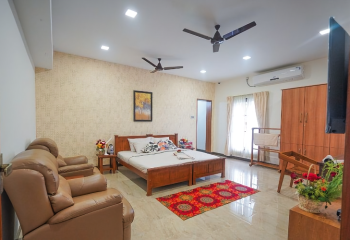More About Chronic Pain Rehabs
Chronic pain is defined as pain that persists for 12 weeks or longer without treatment of any kind. It is estimated that 1 in 5 people suffer from chronic pain , making it extremely common, yet complex to treat. It can often involve recurring mild to severe pain. Chronic pain can stem from conditions like arthritis, endometriosis or nerve damage, or your pain may appear spontaneously without a clear cause. Chronic pain is often debilitating and can negatively impact your quality of life.
Causes of Chronic Pain
The cause of chronic pain is often difficult to determine, as it can be caused by a variety of physical and psychological factors. Physical causes of chronic pain can include injuries, arthritis, nerve damage, infections, and more.
Psychological factors, such as stress, anxiety, and depression, can contribute to chronic pain. These emotions can cause physical tension in the body, leading to pain. A traumatic event can cause chronic pain as the body physically manifests trauma.
Ways To Prevent Chronic Pain Development
When examining the risk factors that are involved in developing chronic pain, there are some controllable lifestyle factors that can be beneficial to your health such as:
- Maintaining good mental health by going to therapy, meditation and/or breathwork
- Smoking cessation
- Limiting alcohol consumption
- Exercising
- Getting enough sleep
- Following a nutritious diet
Managing Chronic Pain
Many times, chronic pain is invisible, which can lead to feelings of isolation and loneliness. It’s important to draw strength from the support of those around you, who may be more understanding and willing to help than you think. With their help and your independent efforts for healing, you can maintain your independence and live an active and fulfilling life despite having chronic pain.
3 impactful options to manage your chronic pain include:
- Exercise
- Continue working
- Medication
If you are physically capable, exercising and continuing to work are 2 of the most effective ways to manage your symptoms and maintain a full life. Inactivity can cause your pain to last longer, exacerbate your anxiety and depression, and make it harder to get moving again.
Exercise does not need to be intense to be effective. Simple movements like walking, stretching, yoga, or biking can help release feel-good endorphins and give you something to look forward to each day. You can also reach out for medical help, which could involve medication and/or physical therapy. Both of these options can greatly help reduce your symptoms and give you back a sense of normalcy.
Questions To Ask Your Provider About Chronic Pain
Ask your doctor questions about your chronic pain, such as:
- What is the cause of my chronic pain?
- What treatment options are available?
- What are the benefits and risks of the treatment options?
- What lifestyle modifications can I make?
- Are there any support groups I can attend?
- Can I recover?
Benefits and Risks of Opioid Medication for Chronic Pain
Many patients develop increased tolerance, and eventually become addicted, to opioids used to treat pain . However, acknowledging that risk, opioid medication can offer a lifeline for many people. If you are considering taking an opioid to help with chronic pain, develop a plan to safely use the medication and avoid opioid misuse by having a conversation with your physician.
If you develop an opioid dependency, attending a rehab for co-occurring disorders can address both your chronic pain and the opioid-use disorder. It's important to seek professional help if your chronic pain has resulted in the development of a substance-use disorder.
Therapies Used for Chronic Pain Management
Living with a chronic condition can get you stuck in a cycle of negative thoughts, which can lead to anxiety and depression. Chronic pain can also cause you to cope by reaching for a substance that can take the edge off and provide relief. If you’ve noticed your mood has changed to feeling hopeless, tense or scared, or if you are self-medicating to find relief, reach out to a licensed professional counselor whose expertise can be crucial to improving your mental health. Talk therapy can be one of the most beneficial ways to manage your pain. Engaging in conversation with your counselor who is unbiased and empathetic can feel like a sigh of relief. They can also help you explore your mental state and provide you with coping strategies.
As you search for a professional counselor to address your mental health and chronic pain, look for professionals who use cognitive behavioral therapy (CBT) to help reduce catastrophizing and negative thought loops.
In addition to CBT, treatment using acceptance and commitment therapy (ACT) can help you do the hard work of coming to a place of acceptance regarding your pain. After you come to a place of acceptance, ACT can help propel you to re-engage in your life in ways that make you feel alive again.
Another type of therapy called mindfulness-based stress reduction (MBSR) can help you orient yourself to the present moment. It helps you become aware of your thoughts and emotions, reminds you not to judge yourself, and takes you out of “fight, flight or freeze.”
Other holistic therapies like yoga, acupuncture, breathwork and reiki can also help reduce negative thoughts by getting you out of your mind and into your body.
Continuum of Care for Chronic Pain
If you are experiencing chronic pain, it can be extremely beneficial to work with a multidisciplinary team of people who are trained to treat your condition in an effective way. If needed, rehab can also help you detox from opioids or alcohol before beginning your physical and psychological treatment. You can attend rehab part-time or full-time , depending on the severity of your symptoms. The levels of care at rehab are:
- Outpatient- individual or group counseling 1-2 times per week
- Intensive outpatient - individual or group counseling 3-5 times per week for several hours at a time
- Partial hospitalization -full day treatment for 5-7 days per week
- Inpatient - live-in treatment at a residential facility or hospital where you will receive ‘round the clock medical monitoring and multidisciplinary treatment surrounded by peers
How To Help A Loved One With Chronic Pain
Supporting a loved one with a chronic pain condition can make a significant difference in their wellbeing. Some ways you can help include:
- Educate yourself about their condition
- Be a good listener
- Respect their boundaries
- Empower their decision-making
- Offer a positive outlook
Remember that your support is invaluable. Having someone who understands, cares and is there to support them can make a world of difference.
























